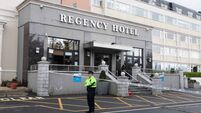EU should not ‘declare war’ on citizens over rise in drug violence

Ciro (Marco D’Amore) and Gennaro (Salvatore Esposito) in 'Gomorrah', referenced by Caivano commissioner Stefano Ciavela during the EU Drugs Agency webinar. Picture: Emanuela Scarpa/Hollywood Suite
European governments should not “go backwards” and “declare war” on their own citizens because of an upsurge in drug-related violence in many countries, the head of the EU drugs agency has said.
Alexis Goosdeel said that tackling crime associated with drug use and violence linked to drug trafficking is “extremely complex” and warned it needs a “holistic, not hostile, approach”.
















